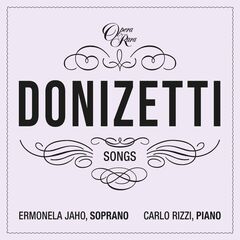Für seinen Zyklus mit Aufnahmen der Donizetti-Lieder hat sich der Pianist Carlo Rizzi Ermonela Jaho an Bord geholt (dies nach Michael Spyres, Nicola Alaimo, Marie-Nicole Lemieux…). Das ist für die Sopran-Lieder die beste Wahl.
Mit der für mich aktuell besten Sopranistin für das italienische Repertoire sind diese lyrischen, leidenschaftlichen und durch und durch romantischen Lieder ein großartiges Hörerlebnis.
Ermonela Jaho singt in jedem dieser Lieder – es sind eigentlich schon Arien – mit tief empfundener Überzeugung. Ihre technisch perfekt geführte, wunderbar ausgeglichene und flexible Stimme glänzt in den intimeren genau wie in den dramatischen Momenten. Man könnte viele Beispiele für ergreifende Interpretationen anführen, doch will ich mich auf eine der bewegendsten beschränken, die von La Mère et l’Enfant, einem Lied, das viele Emotionslagen durchstreift und mit den heute immer noch hoch aktuellen Worten endet, « Mon enfant est mort, est mort de faim. » Dieses Lied ist eines der anspruchsvollsten und emotional weitreichendsten dieser beiden Alben.
Es erzählt von einer verzweifelte Mutter, die um Brot fleht und deren Ängste um das Leben des Kindes immer schmerzlicher und drängender werden. Für eine Sängerin wie Ermonela Jaho, die wie keine andere die Inhalte erlebt und zum Erleben aus ihrer singenden Seele zum Hörer schickt, ist das ein Terrain, auf dem sie ihre ganze Kunst zeigen kann.
Jedes einzelne der 17 Lieder dieser Kollektion wird in Ermonela Jahos Kehle zu einem Juwel. Ihre Interpretationen, ihre Charakterisierungen bringen Freude und Angst, Trotz und Jubel, Stärke und Verletzlichkeit, Leidenschaft und Tragik, geflüstert oder kraftvoll expressiv zum Ausdruck, wobei sie den Zuhörer von Erheiterung bis zum Erschauern ergreift.
For his cycle of Donizetti song recordings, pianist Carlo Rizzi brought on Ermonela Jaho (following Michael Spyres, Nicola Alaimo, and Marie-Nicole Lemieux). She is the best choice for soprano songs.
With Jaho, whom I consider to be the best soprano for the Italian repertoire today, these lyrical, passionate, and thoroughly romantic songs are a great listening experience.
Jaho sings each of these songs – which are actually arias – with deep conviction. Her voice, which is technically perfect, wonderfully balanced, and flexible, shines in the more intimate moments as well as in the dramatic ones. There are many examples of moving interpretations, but I will limit myself to one of the most moving: La Mère et l’Enfant. This song traverses many emotional states and ends with the words that are still highly relevant today: « Mon enfant est mort, est mort de faim. » (My child is dead, starved to death). It is one of the most demanding and emotionally far-reaching songs on these two albums.
It tells the story of a desperate mother begging for bread whose fears for her child’s life become increasingly painful and urgent. For a singer like Ermonela Jaho, who experiences and conveys the song’s content like no other, this is terrain where she can showcase her entire artistry.
Each of the 17 songs in this collection is a jewel in her throat. Her interpretations express joy and fear, defiance and jubilation, strength and vulnerability, and passion and tragedy. Whether whispered or powerfully expressed, they captivate listeners, evoking everything from amusement to shuddering.
Titelliste:
La ninna-nonna, Dormi fanciullo mio; Quando il mio ben io rivedrò; Il pescatore, Era l’ora che i cieli lente; L’amor moi, Amo sì, ma l’amor mio; È più dell’onda instabile; Che non mi disse un dì!; Che non mi disse un dì!; Amor, che nullo amato; Giovanna Gray, Io morrò! sonata è l’ora; Eterno amore; Lu trademiento Ah tradetore, tu m’haje lassata; Non m’ami più; La tradita, Ah! ingrato, m’inganni; Se a te d’intorno scherza; La conocchia, Quann ’a lo bello mio; Dell’anno novello; Come volgesti rapidi; Lamento per la morte di Bellini; La Mère et l’enfant; Au tic-tac des castagnettes; Depuis qu’une autre a su te plaire; Au pied d’une croix; J’attends toujours. Dans sa course rapide; Les Billets doux; La Jeune; La Chanson de l’abeille; La nouvelle Ourika, Dès le berceau, toujours avec courage; Faut-il renfermer dans mon âme; La Savoyarde, Je quitte la montagne; Heureuse qui près de toi; Le Bal masqué, Je les ai vus entrer dans cette loge; Les Revenans, Un soir à l’heure où finit la veillée; Oui, je sais votre indifférence; Le Prisonnier de guerre, Marie, enfin quitte l’ouvrage; Il serait là, Plus ne m’est rien





















